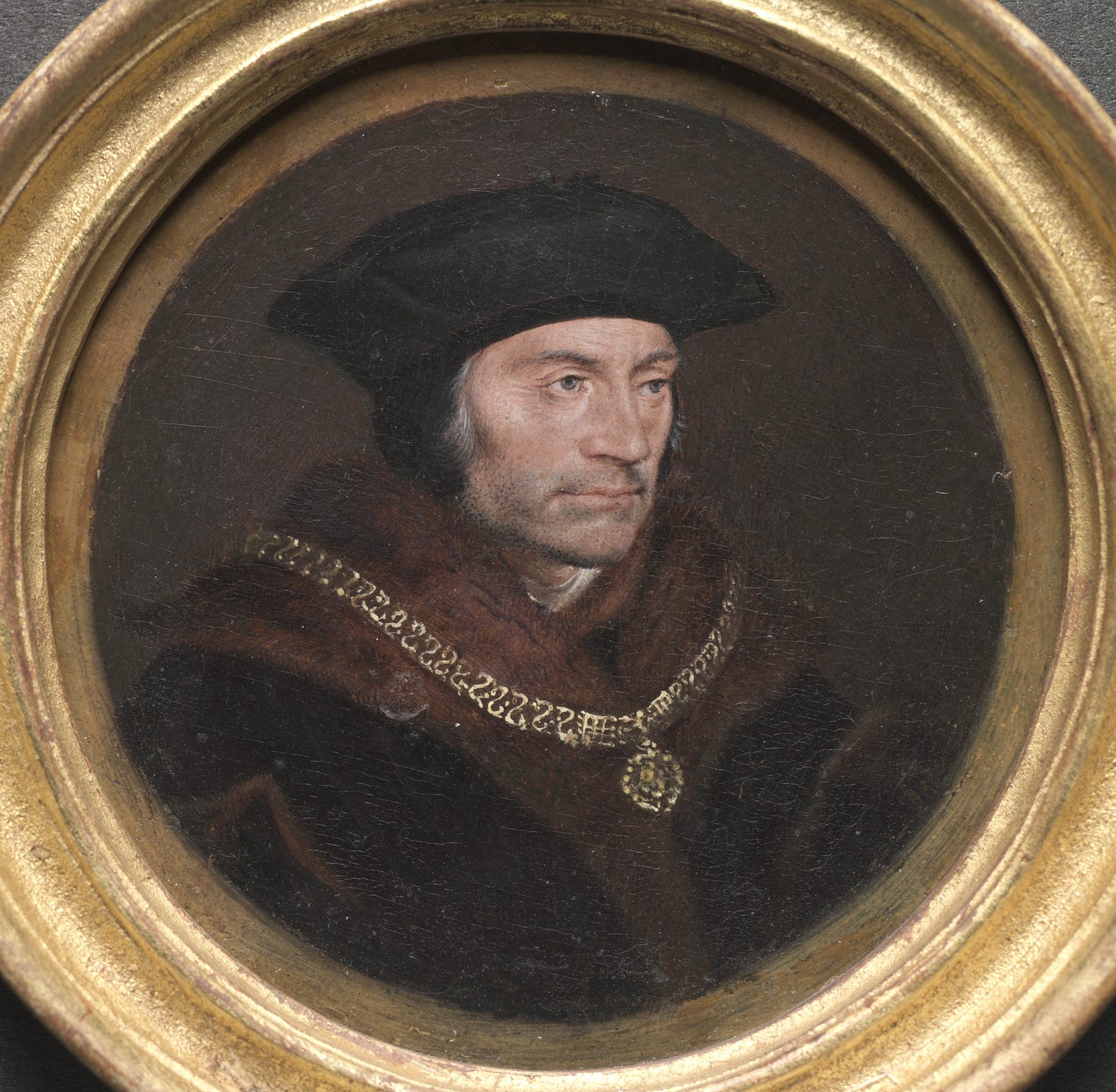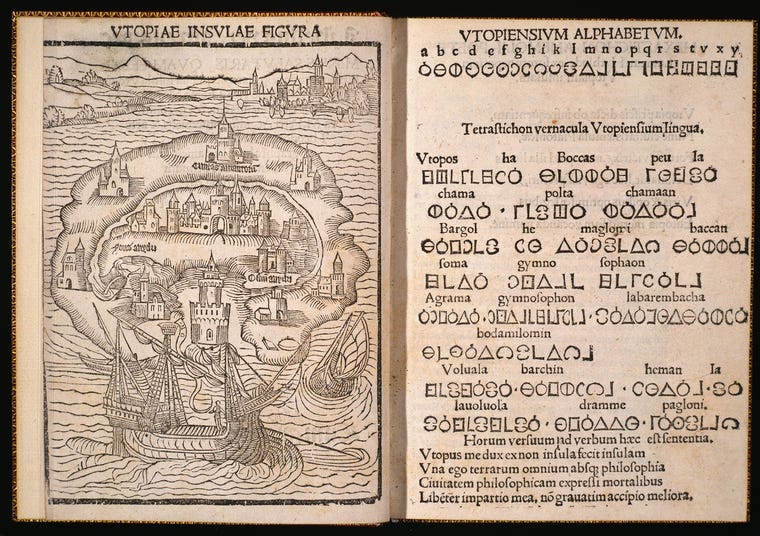This past Sunday, June 22, was the feast of St. Thomas More, a saint that until this past week I knew practically nothing about - so I decided to change that.1 Perhaps you know much more than I did, or at least knew his general story, but I’d like to share with you what my search turned up. As a Catholic library nerd, I couldn’t just leave my search at the perusal of the Saints & Angels page, though I did start there.2

Sir Thomas More lived from 1478-1535 in London, England. His father, Sir John More, was a prominent lawyer and judge whose success during the reign of Edward IV helped Thomas rise in station as a young man. Thomas followed in his father’s footsteps, becoming a lawyer in 1502. Before his election to parliament in 1504, he contemplated becoming a Carthusian monk, as he lived next to a monastery and often joined the monks in their daily prayers. In 1505, he married his first wife, with whom he had four children before her death in 1511. He eventually had three more wives, each passing before him, leaving him a widower.
Thomas was a loving father and insisted that his daughters receive equal education to his sons - a rarity at that time. His hard work and dedication brought him the affection of King Henry VIII, to whom More was fiercely loyal. It was this relationship, though, that brought his downfall. When Henry VIII decided he desired to divorce Catherine of Aragon in order to marry Anne Boleyn, and named himself head of the Church of England, Sir Thomas could not condone the king’s actions any longer. Though he tried to slip out of the limelight quietly, citing ill health, eventually Henry demanded approval from him that he could not give. Facing multiple charges, More was arrested and imprisoned in the Tower of London. When his trial came, despite a brilliant defense on his part, More was convicted by a court that included Anne Boleyn’s father, brother, and uncle. As he ascended the scaffold, he is reported to have said, “I die the king’s good servant, and God’s first.”
St. Thomas More is the patron saint of adopted children, civil servants, lawyers, politicians, and difficult marriages. He is known for his work Utopia, one of the greatest works of the late Renaissance, but his larger legacy is that of his martyrdom and the tremendous integrity that he showed despite all odds.
Pope Leo XIV just this week encouraged politicians to look to the example set by St. Thomas More. “During the Jubilee of the Year 2000,” he said, “St. John Paul II indicated St. Thomas More as a witness for political leaders to revere and an intercessor under whose protection to place their work. Sir Thomas More was a man faithful to his civic responsibilities, a perfect servant of the state precisely because of his faith, which led him to view politics not as a profession but as a mission for the spread of truth and goodness.”3
In addition to reading around recent mentions of the great saint with the passing of his feast day, I gathered a selection of primary and secondary resources that are open access to aid you in study and contemplation of St. Thomas More’s life and dedication to the Catholic faith. Everything is linked with descriptions as necessary; let me know if you need help accessing any of these great resources!
“I die the king’s good servant, and God’s first.”
- St. Thomas More on the scaffold, July 6, 1535.
Primary Sources:
Utopia, by Sir Thomas More
Published in 1516 and written in Latin, Utopia is a work of fiction and satire depicting a perfect society and its religious, political, and social customs. This is the work from which we get the term “utopia,” coined by More himself from the Greek words ou (“not, no”) and topos (“place”). It is still widely read among philosophers, scholars, and lovers of English literature. Many versions are available online, including scans of first edition printings:
Project Gutenberg (Free Ebook download): https://www.gutenberg.org/ebooks/2130
Translation by Ralph Robinson with Introduction by H.G. Wells:4 https://archive.org/details/in.ernet.dli.2015.274620/mode/2up
First Edition, held by the New York Public Library: https://www.nypl.org/events/exhibitions/galleries/beginnings/item/3551
Printed 1518 copy with gorgeous woodcut illustrations purchased by Queen Victoria: https://www.rct.uk/collection/1086970/utopia

The Complete Works of St. Thomas More
Published by Yale University Press, all volumes are available through the Internet Archive: https://archive.org/details/completeworksofs0012unse/page/n5/mode/2up
The Center for Thomas More Studies
The Center “seeks to advance the study and teaching of Thomas More’s life and writings, with a special emphasis on More’s understanding of law, liberty, and leading citizenship.” Their website has extensive resources, including PDFs of much of his work and major works written about him: https://thomasmorestudies.org/
Secondary Sources:
“Masterpiece: St. Thomas More’s Epitaph” - Excellent piece from The Catholic Thing reflecting on St. Thomas’ epitaph, which he wrote three years before his death.
“Cardinal Burke Venerates Relic of the Head of St. Thomas More” -St. Thomas More was beheaded and his body was placed in an unmarked grave in the Tower of London. As was custom, his head was displayed on a spike on the London Bridge. By bribing a guard, More’s daughter Margaret was able to obtain the only first class relic of the saint, which was entombed with her after her passing in St. Dunstan’s Church in Canterbury, England. This article from the National Catholic Register details Cardinal Burke’s impactful visit to venerate the relic.
The Life of Sir Thomas More by William Roper (More’s son-in-law), edited by members of the Center for Thomas More Studies.
A Man for All Seasons play by Robert Bolt, adapted for film in 1966.
Sir Thomas More play by William Shakespeare.
Also his feast day was eclipsed - and rightly so! - by the Feast of Corpus Christi and its falling on a Sunday this year. This is just a post to have in your pocket for this time next year!
If you haven't used this resource from Catholic.com, bookmark it! It's a great place to start when you are looking for information on specific saints! https://www.catholic.org/saints/saint.php?saint_id=324
Yes, that H.G. Wells of the sci-fi fame.




